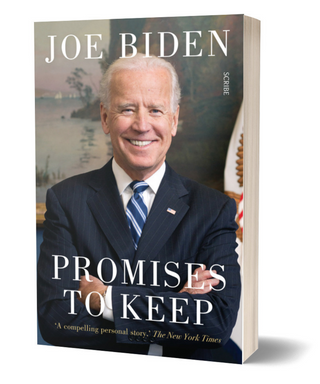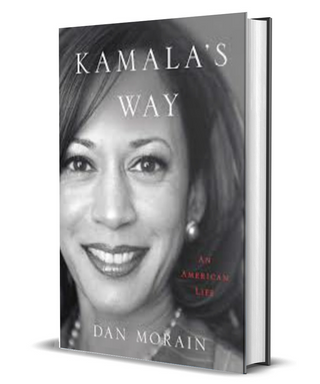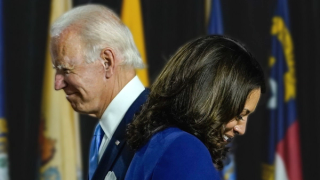As Joe Biden assumed the presidency, Scribe reissued his 2008 campaign biography, Promises to Keep. It’s a very smart publishing decision because it brings to us the true bedrock of Biden in public life. We get the raw Biden as he matures from his young days, before becoming Barack Obama’s vice-president, before fulfilling his promise to his dying son not to give up, but to go on, lovingly recounted in Promise Me (2017).
Biden is a regular guy. An American story of a kid propelled in life on the back of the middle class that surged after World War II. He loved football and girls; was a good but lazy student; did law; and fell in love – twice – at first sight. He trained his brain and mouth to overcome a terrible stutter, echoes of which you can still hear today, if you listen closely, as he gives speeches. He stands always with working people. And with people of colour who face racism every day; he was a lifeguard in the summer at the pools where black kids would swim. He quit a corporate law firm in Delaware to become a public defender.

Biden’s flaws are all here too. His coasting in law school. His gushing, endless speeches. The plagiarism of a speech by former British Labour leader Neil Kinnock that ended his 1988 presidential run. And that episode – Biden was so hungry for a theme that he took Kinnock’s life story without attribution – reflected his most profound political flaw: that he never settled on a message of why he wanted to become president and what he wanted to do with it.
David Broder, the dean of political journalists in Washington at the time, wrote: “He is impulsive, but not all his instincts are self-serving or self-aggrandizing. As gifted as he is at 45, I think Democrats will find him far better presidential material at 49 or 53 or 57 or 61.” How about at 78?
Biden comes to office as the most experienced president ever, with four decades in the Senate and eight years as vice-president. It is a lot of fun to read his up-close encounters with some of his predecessors.
Biden comes to office as the most experienced president ever, with four decades in the Senate and eight years as vice-president. It is a lot of fun to read his up-close encounters with some of his predecessors.
“Jimmy Carter was a man of decency and a man of principle, but it wasn’t enough. That’s the first time I realised that on-the-job training for a president can be a dangerous thing.”
Biden talking to Clinton: “Mr. President, you know what your problem is?”
Talking through clenched teeth, “No, what’s my problem?”
“You suffer from the Rhodes Scholar disease.”
“What the hell do you mean?”
“Mr. President you are so accustomed to having facts at your disposal, you don’t trust your instincts. Trust your instincts Mr. President.” I think you think you can be president when you can talk to a president like that.
Biden is relentlessly honest. He loved the Senate and his friendships there, especially with the old bull segregationists that Kamala Harris excoriated him over in one of their debates. Biden hates the paralysing hyper-partisanship of radical Republicans. “We’ve lost our ability to disagree without being disagreeable … Partisanship rips at the bonds of affection that tie the country state-to-state, political party to political party, citizen to citizen.”
This is where Biden’s overriding message of uniting the country began.

To help him do it, he chose Kamala Harris as his Vice-President. She is living history as the first woman of Indian descent and African American identity to serve in that office. In Kamala’s Way we are guided through the political highlights of her life. While author Dan Morain is a veteran political journalist unfortunately the life story presented is deeply superficial.
But what comes through so clearly is how compassionate she is; how fiercely she uses her intelligence to drive her principles (most emphatically on delivering justice and change), how motivated, engaging and hardworking she is.
Biden played a long game over a span of 30 years in running for the White House. Harris plays a long game too. Biden can be a big foot in a small state such as Delaware; it is much harder to make a mark in the Republic of California. And she understood that the real road to Washington for her was to use an office such as District Attorney in San Francisco to become Attorney-General for the state, and then to the Senate. And then track what Obama did, running in his first term as senator for president.
While author Dan Morain is a veteran political journalist unfortunately the life story presented is deeply superficial.
But her 2016 campaign had immense problems. She ducked the media. She had shifting positions. She could not break out as the leading woman in the race (that was Elizabeth Warren). She could not define her campaign – like Biden in ’88. She could not raise decent money and pulled out before facing the humiliation of losing a presidential primary in her home state.
But she was the answer for what Biden wanted – and needed. A woman on the ticket. A person of colour in a time of profound racial challenge. An immensely capable person who could step in as president in a heartbeat. A leader of ability who was worthy of being the last person in the room to talk with the president about a major decision. A person who had his trust and his back, just as Biden had Obama’s.
In 2007, Biden landed this clunker on Obama: “You got the first mainstream African-American who is articulate and bright and clean and a nice-looking guy.” But Obama still picked him as Vice-President. Harris ripped Biden for his positions on integration and school busing. “That little girl was me” on a school busing program in Berkeley that Biden opposed, she said. And Biden still chose Harris. And she enthusiastically accepted.
Biden and Harris know where they want to take the country, and the values that will guide them. And if they are really good, they will help America get there.






